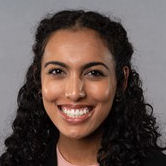
Rachana Raghupathy
Chair, Ohio ACP Council of Student Members
— MEDICAL SCHOOL —
Northeast Ohio Medical University
— GRADUATING CLASS —
2022
Like many others who enter the profession, I decided to pursue medicine because I wanted to help people. I wanted to save lives. I wanted to become a medical detective and solve the “unsolvable” problems my patients presented with.
As a student, it's easy to get caught up in the fantasy of what we picture medical practice to be. Many of us rely on modern media and entertainment to give us a glimpse of what it's like to be a physician: how much impact we can make and how many lives we can save. We strive to be heroes, the only one in the entire hospital who diagnoses the one medical zebra. During my third-year rotation on internal medicine, I learned that there is so much more to it than that.
My patient, let's call him Mr. Doe, was a 30-something-year-old man who came in with severe headache and photophobia that later progressed into allodynia and hyperalgesia. His vitals were all within normal limits, but he continued to have excruciating pain. We ordered all of the major tests and imaging—MRI, lumbar punctures, cerebrospinal fluid cultures, empiric medications—to rule out the most serious etiologies of his pain. None of these yielded any answers about what could be causing his symptoms. He was eventually discharged, forced to take his pain home with him.
I felt so invested in his case—he had been on my rounds from day 1 to discharge—and I wanted more closure with his case. I was eager to correlate what I had learned in my textbooks, but most of all, I was hungry for answers. My days included countless UpToDate searches to produce differentials for his symptoms. Thalamic pain syndrome? Focal seizure? Complicated migraine? Spinal stenosis? Conversion disorder? Pretty soon, I found myself getting caught up in wanting to solve the case that had proven unsolvable. I found myself getting caught up in being the detective so naturally that, when he was discharged, I felt angry. I felt angry that he came in with pain and he left with pain: we did nothing but order expensive tests and poke and prod at him. I felt angry that we failed him. We hadn't cured him. We hadn't even given him an answer. How could we just leave him hanging?
As I described my frustrations to my attending, he quickly reminded me that hospital stays come at a cost, and no one is more hurt by unnecessarily prolonged stays than the patient him/herself. He reminded me of the slew of hospital-acquired illnesses we put patients at risk for, the psychological implications of being bedbound for an extended period of time, and the financial burden placed on not only the hospital system but especially those also placed on the patient. He told me, “We need to do the most we can, but we need to know our own limits. We can't solve every case. Our job is to get the patient stable enough to take care of himself.”
His response did not immediately make me feel any better about the situation. I felt the same kind of frustration, the same kind of anger on the patient's behalf. But the more I thought about it, the more his words began to sink in. All of medicine is based on costs and benefits. We tell patients to make their own medical decisions based on the pros and cons of the test, medication, or therapy at hand. How is this any different? Here, we must weigh the costs and benefits of keeping patients in the hospital and exposing them to all of the harms and stressors that may present.
I remember during my first week on ICU, one of the residents told me, “Don't try to be a hero. That's not the goal here.” Taken in context, he was talking about fatigue setting in when rotating compressors frequently during a code. I've realized over the weeks that a lot of medicine requires us as (future) physicians to let go of our egos. It's not our job to swoop in and save the day. It's our duty to do what we can, know our limits, and know when to step back. We must learn to say there's nothing more we can do to meaningfully help this patient, no matter how hard it is to stomach the associated sense of defeat. More than anything, what I learned from the experience was a lesson in humility. Prioritizing the patient also means letting go of your own personal investments to find answers to unsolvable questions—especially when those investments come at the cost of the patient.

